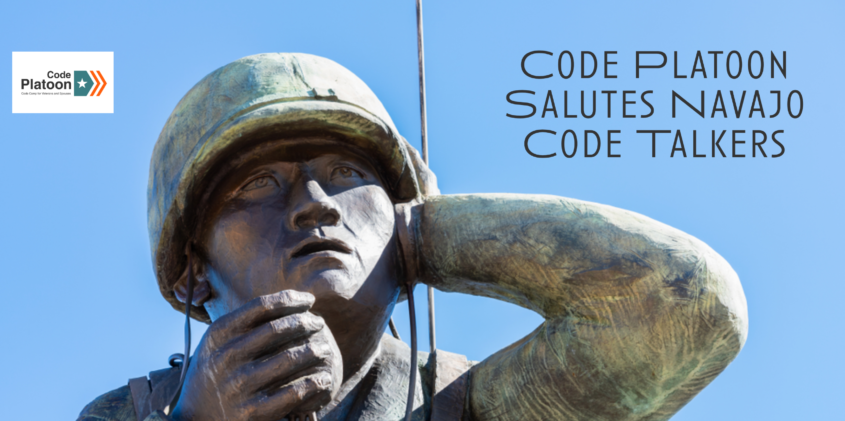Code Platoon Salutes Navajo Code Talkers
November is Native American Heritage Month. This month presents an opportunity to educate the public about the proud history of Indigenous people in America and celebrate the rich and diverse tribal cultures that continue to thrive throughout Indian Country. Code Platoon recognizes the significant contribution that Native Americans have made to our military.
Many in the software development world will tell you that understanding code from a language perspective is more helpful than approaching it as a scientific problem.
For this reason, to learn the history of computer coding ]we need to learn about the history of cryptography—encoding messages for the purpose of secret transmission, usually in times of war. In that realm, we are woefully uninformed if we do not dig into one of the greatest cryptographic stories in the history of warfare: the Navajo Code Talkers of WWII, and the impact they had in beating the Axis powers.
Anyone who has taken part in military operations knows the value of secure transmissions. The ability to reliably communicate something to your fellow warfighters without the enemy knowing about it is a key element in the trifecta of successful combat maneuvering (i.e., shoot, move, and communicate).
With the advent of technologically sophisticated cryptographic machinery like Enigma and SIGABA, and the knowledge that the Germans and Japanese were probably working on something similar, the race was on to figure out the most reliable means for the passing of information in a theater of war. Both the US and Great Britain saw the advantages of breaking the enemy’s codes, so preventing that from happening was a priority.
The US Marines, operating in the Pacific theater, had a different idea: rather than relying on technological innovation, they found a solution in an ancient culture, deeply rooted in America. In recruiting 29 men from the Navajo Nation, Marines had access to what became an unbroken code, one that would help them win major battles like the one on Iwo Jima.
The Code Talkers took key military phrases and tactics and assigned Navajo terms to them, thus creating a simple code for those who were fluent in the language. This had two advantages: first, Navajo was an unwritten language, so there was no source which the Japanese could consult in order to decipher this code; second, while encrypted messages could often take 30 minutes or more on a cryptography machine, Navajo Code Talkers could speak volumes to one another in mere seconds.
To claim that this had a positive impact on military operations for the US Marines would of course be a vast understatement. The use of an indecipherable language was the communications equivalent of tying one of the enemy’s arms behind their backs.
But the importance of the code talkers goes well beyond just understanding military tactics and how vital is the role of communications in those operations. For starters, it offers us the opportunity to celebrate the contributions of diverse people groups coming together to solve complicated problems for the purpose of serving the greater good. The United States and the Navajo people have not always enjoyed the most positive relationship, but these men still served in a time of need.
Secondly, this is a lesson in problem solving that those in the tech world would do well to remember. We often operate under the assumption that some new piece of tech or cutting edge process will be the answer to a complex problem. Sometimes, however, as was the case with the Navajo Code Talkers, the solution already exists in something more ancient.
Coding is a form of language, and the history of programming is incomplete without understanding its reliance on code, code writing, and the deciphering of that code by both machines and humans. So, we at Code Platoon would like to salute those who contributed to this incredible history in the most heroic of ways—when they had every reason not to.
Greg Drobny is a former Airborne Infantryman, PSYOP Team Chief, political consultant, professional mil blogger, and is Code Platoon’s Student Outreach and Recruitment Manager. He holds a BA and MA in history, as well as a Masters of Science in organizational psychology. He is married with four children who keep him more than slightly busy and is passionate about helping Veterans find their paths in life and develop the skills needed to pursue their goals.

